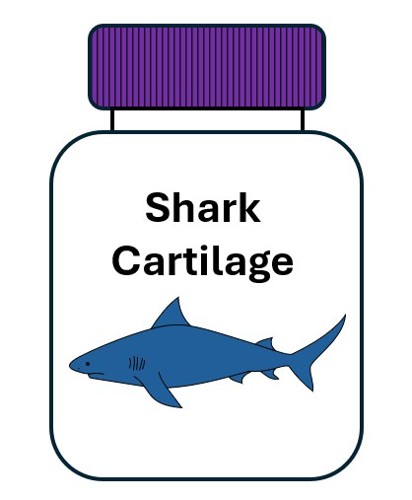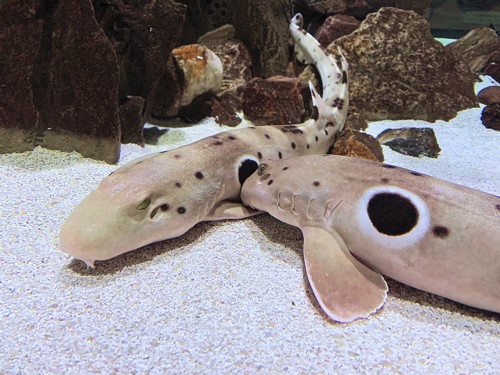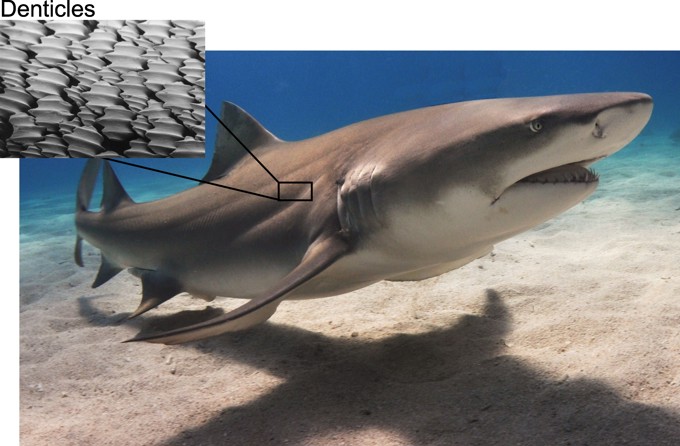
Is it true that sharks don’t get cancer or other diseases?
August 8, 2025

- Related Topics:
- Animal biology,
- Cancer,
- Genetic myths
A high school student from Georgia asks:
"Are sharks disease free?"
This is a fun question, and a great myth to debunk!
It’s a common misconception that sharks don’t get cancer or other diseases. Sharks have been around for hundreds of millions of years, so from an evolutionary perspective, they are very successful. This success does not mean that they are invincible though. They can still get cancer and infections.
That being said, we can learn a lot from sharks! Their genomes (the collection of genes with all of the instructions needed for life) are much larger than ours, and their immune systems have some really cool quirks. Let’s dive a bit deeper into shark genetics and uncover the truth about cancer and other diseases in sharks.
So, sharks can get cancer?
Yes. Sharks can get cancer. While it is very tricky for scientists to figure out how often sharks get cancer, there have been multiple cases of sharks with tumors.1 A big reason why this myth spread so much is because shark cartilage has been sold as a treatment for many human diseases, including cancer. However, medical research has not actually shown that shark cartilage can fight cancer in humans.

So, if sharks do get cancer, and shark cartilage does not cure cancer, why spend time diving deeper into this topic?
Sharks have a lot of genes for preventing DNA damage and mutations
Although sharks can get cancer, scientists have found that they have a lot of genes with the information needed to make proteins that help prevent cancer.
Cancer is caused by mutations (changes in an organism’s DNA) that cause cells to grow abnormally. Mutations can happen randomly when cells copy their DNA and divide to make new cells, and they can also appear if DNA gets damaged.

Scientists studying white shark genomes found that about one third of the genes most favored by evolution provide the instructions for making proteins that repair DNA.2 They noticed similar patterns in whale sharks and elephant sharks, suggesting that this may be true for various kinds of sharks.
A few years later, a different team of scientists found more evidence that shark biology is especially good at preventing mutations. When they compared DNA sequences from parent Epaulette sharks and their offspring, they found that the rate of random mutations in these sharks is one of the lowest seen for any vertebrate so far!3

(Image by Coughdrop12, CC BY-SA 4.0, via Wikimedia Commons)
Not only are these discoveries super interesting, but they can also aid scientists in finding ways to help both humans and sharks. Learning how sharks prevent mutations may provide new ideas for tackling cancer in humans. Meanwhile, understanding how low mutation rates may slow down shark evolution and put sharks at more risk from environmental changes can help us better appreciate the importance of protecting sharks and their environment.
Sharks can get cancer, but what about infections?
It might surprise you, but sharks can get infections just like we can!
Vibrio is a group of bacterial species that thrive in aquatic environments, and these bacteria can infect marine animals, like sharks. Sharks don’t just get bacterial infections either. They can also get parasitic and viral infections.
Although sharks can get infections, they do have some really cool defenses, and scientists are starting to find ways we can copy them to improve human medicine.
Taking a bite out of biofilms
You’ve probably heard about how sharks have really rough skin. The reason shark skin feels like sandpaper is because it is covered in tiny “tooth-like” structures called denticles. Interestingly, denticles are actually controlled by the same genes that are in charge of shark tooth growth, although they aren’t able to regenerate quite as much as a shark’s teeth.4

So, what do denticles have to do with fighting off infections?
Well, just like us, sharks naturally have bacteria all over their skin. Most of the time, this is totally fine. However, if the bacteria start growing too much and form thick layers called biofilms on a shark’s skin, they could start making the shark sick. Since denticles give shark skin such a rough texture, it is hard for the bacteria to evenly spread across the skin and form biofilms. Denticles also help sharks swim faster by reducing drag as they move through the water, and scientists think this may also help fight biofilms since fast moving water is constantly moving across their skin.
Biofilms are a huge problem in hospitals. The smooth surfaces of medical devices, like catheters, are perfect places for biofilms to form, and these biofilms mean that patients are exposed to all kinds of dangerous bacteria.

Scientists have started looking into re-designing these devices so that instead of having smooth surfaces, they have surfaces that mimic shark skin. By taking this cue from sharks, scientists may be able to prevent people from getting infections.
Shark antibodies, small but mighty
Denticles aren’t the only special trick sharks have up their sleeves though! If any germs do manage to get through their skin, they will have to face the shark’s powerful immune system.
Like us, sharks make antibodies, which are Y-shaped proteins that stick to things like bacteria and viruses. Interestingly, sharks actually make a special type of antibody that may help scientists develop better treatments for fighting viruses! Let’s look more closely at how this works.

Human antibodies have two main parts: a “heavy chain” part and a “light chain” part. Sharks make some antibodies with these two parts, but they also make antibodies that only have the heavy chain. Why might sharks do this?
Shark blood has a lot of a chemical called urea, which helps sharks keep the right amount of water in their bodies, but can damage proteins. The heavy-chain only antibodies that sharks make are better at resisting damage caused by urea than our antibodies are.5
Recently, scientists studying these unique antibodies found that they may also offer better protection against viruses than our antibodies do!
A major issue with fighting viruses is that they are constantly changing their shape. Antibodies recognize very specific shapes, so this means that antibodies that successfully recognized the virus once might not recognize it again if the virus has changed its shape too much. This is why you can get sick from the flu or COVID19 over and over and over again, and it’s why it is really important for scientists to keep updating the vaccines for these viruses.
The parts of antibodies that actually stick to viruses are called the variable regions, and these are in the fork that gives the antibody a Y-shape. Since the variable regions of shark heavy-chain antibodies are a lot smaller than ours and come in different shapes than ours do, they can actually stick to the parts of viruses that are harder to reach and don’t seem to change as much!6

Researchers have started exploring how we can engineer antibodies in the lab based on these special shark antibodies. So far, it looks like these may help us fight viruses like SARS-CoV-2, and they may also help us develop new cancer treatments.
So, to tie all of this together and return to the original question- sharks can get sick; however, their biology can teach us a lot about fighting germs and preventing DNA damage!

Author: Ruth Schade, PhD
When this answer was published in 2025, Ruth was serving as The Tech Geneticist, answering questions submitted from around the world and curating articles for Ask-A-Geneticist. Ask-A-Geneticist is part of the Stanford at The Tech program, which brings Stanford scientists to The Tech Interactive to facilitate genetics activities in the BioTinkering Lab.
 Skip Navigation
Skip Navigation
